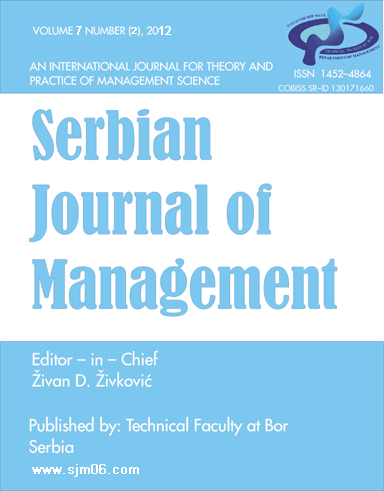Multi - Criteria Ranking of the Danube Water Quality on its Course Through Serbia
Sažetak
This paper presents the results of multi-criteria ranking of the Danube water quality along its course through Serbia by using PROMETHEE/GAIA method. The ranking was based on the values of the water quality parameters measured at eight measuring stations on the Danube River in 2010. For the purposes of the investigation, ten water quality parameters that indicate physical, chemical and microbiological characteristics of water were selected. These parameters are also used in the WQI (Water Quality Index) methodology in determining the overall water quality. The results show that the water quality on the exit profile is better than the quality of the water at the entrance profile.
Reference
Babović, N., Marković, D., Dimitrijević V., & Marković, D. (2011). Some indicators of water quality of the Tamiš River. CI&CEQ 17(1): 107-115.
Banerjee, T. & Srivastava, R.K. (2009). Application of water quality index for assessment of surface water quality surrounding integrated industrial estate-Pantnagar. Water Science and Tehnology, 60 (8): 2041-2053.
Brans, J.P. (1982). L’ingénièrie de la décision; Elaboration d’instruments d’aide à la décision, La méthode PROMETHEE, in Nadeau, R., Landry, M. (Eds.), L’aide à la décision: Nature, Instruments et Perspectives d’Avenir, Presses de l’Université Laval, Québec, Canada, pp. 183–213.
Brans J.P., Mareschal B., & Vincke Ph., (1984). PROMETHEE: A new family of outranking methods in multi-criteria analysis, in: Brans, J.P. (Ed.), Operational Research ’84. North-Holland, Amsterdam, pp. 477-490.
DCLG (2009). Department for Communities and Local Government. Multi-criteria analysis: a manual, Eland House, Bressenden Place, London, pp. 46.
ICPDR (2005). WFD Roof Report 2004 Document IC/084.
Kannel, P.R., Lee, S., Lee, Y.S., Kanel, S.R., & Khan, S.P. (2007). Application of water quality indices and dissolved oxygen as indicators for river water classification and urban impact assessment. Environmental Monitoring and Assessment, 132(1-3): 93-110.
Khalil, W.A-S., Goonetilleke, A., Kokot, S., & Carroll, S. (2004). Use of chemometrics methods and multicriteria decision-making for site selection for sustainable on-site sewage effluent disposal. Analytica Chimica Acta, 506(1): 41–56.
Lim, Mc.C.H., Ayoko, G.A., & Morawska, L. (2005). Characterization of elemental and polycyclic aromatic hydrocarbon compositions of urban air in Brisbane. Atmospheric Environment, 39(3): 463-476.
Macharis C., Springael J., De Brucker K., & Verbeke A. (2004). PROMETHEE and AHP: The design of operational synergies in multicriteria analysis. Strengthening PROMETHEE with ideas of AHP. European Journal of Operational Research 153(2): 307-317.
Nikolić, Đ. (2010). Multicriteria analysis of the pollutants distribution in the urban surroundings of copper smelters. PhD thesis. Technical faculty in Bor, Bor (in Serbian).
Nikolić, Đ., Milošević, N., Mihajlović, I., Živković, Ž., Tasić, V., Kovačević, R., & Petrović, N. (2010). Multi-criteria analysis of air pollution with SO2 and PM10 in urban area around the copper smelter in Bor, Serbia. Water Air Soil Pollut., 206(1-4): 369–383.
Reza, R., & Singh, G. (2010). Heavy metal contamination and its indexing approach for river water. International Journal of Environment Science and Technology, 7(4): 785-792.
RHSS (2010). Republic Hydrometeorological Service of Serbia, Report – 3. Water quality 2010, Belgrade (In Serbian).
Sanchez, E., Colmenarejo, M., Vicente, J., Rubio, A., Garcia, M., Travieso, L., & Borja R. (2007). Use of the water quality index and dissolved oxygen deficit as simple indicators of watersheds pollution. Ecological Indicators 7(2): 315-328.
Scottish Development Department (1976). Development of a Water Quality Index. Engineering Division, Edinburgh.
Visual Decision Inc., (2007). Getting Started Guide, Decision Lab 2000 - Executive Edition, Montreal, Quebec, Canada.
WHO (2009). World Health Organization. Environment and Health performance review, Serbia. WHO Regional Office for Europe, Denmark, pp. 11.
The Author wishes to submit the Work to SJM for publication. To enable SJM to publish the Work and to give effect to the parties’ intention set forth herein, they have agreed to cede the first right to publication and republication in the SJM Journal.
Cession
The Author hereby cedes to SJM, who accepts the cession, to the copyright in and to the paper.
The purpose of the cession is to enable SJM to publish the Work, as first publisher world-wide, and for republication in the SJM Journal, and to grant the right to others to publish the Work world-wide, for so long as such copyright subsists;
SJM shall be entitled to edit the work before publication, as it deems fit, subject to the Authors approval
The Author warrants to SJM that:
- the Author is the owner of the copyright in the Work, whether as author or as reassigned from the Author’s employee and that the Author is entitled to cede the copyright to SJM;
- the paper (or any of its part) is not submitted or accepted for publication in any other Journal;
- the Work is an original work created by the Author;
- the Author has not transferred, ceded, or assigned the copyright, or any part thereof, to any third party; or granted any third party a licence or other right to the copyright, which may affect or detract from the rights granted to SJM in terms of this agreement.
The Author hereby indemnifies the SJM as a body and its individual members, to the fullest extent permitted in law, against all or any claims which may arise consequent to the warranties set forth.
No monetary consideration shall be payable by SJM to the Author for the cession, but SJM shall clearly identify the Author as having produced the Work and ensure that due recognition is given to the Author in any publication of the Work.
Should SJM, in its sole discretion, elect not to publish the Work within 1 year after the date of this agreement, the cession shall lapse and be of no further effect. In such event the copyright shall revert to the Author and SJM shall not publish the Work, or any part thereof, without the Author’s prior written consent.

